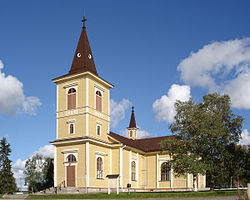
Back Муонио BA Muonio Catalan Muonio (munisipyo) CEB Muonio (obec) Czech Muonio German Muonio EO Muonio (Laponia) Spanish Muonio vald ET Muonio EU مونیو FA
You can help expand this article with text translated from the corresponding article in Finnish. (January 2022) Click [show] for important translation instructions.
|
Muonio
Muonio (Finnish) Muoná (Northern Sami) | |
|---|---|
Municipality | |
| Muonion kunta (Finnish) Muonio kommun (Swedish) | |
 | |
 Location of Muonio in Finland | |
| Coordinates: 67°57.5′N 023°41′E / 67.9583°N 23.683°E | |
| Country | |
| Region | Lapland |
| Sub-region | Fell Lapland |
| Charter | 1868 |
| Government | |
| • Municipal manager | Laura Enbuska-Mäki |
| Area (2018-01-01)[1] | |
• Total | 2,039.97 km2 (787.64 sq mi) |
| • Land | 1,904.05 km2 (735.16 sq mi) |
| • Water | 133.91 km2 (51.70 sq mi) |
| • Rank | 31st largest in Finland |
| Population (2024-10-31)[2] | |
• Total | 2,305 |
| • Rank | 244th largest in Finland |
| • Density | 1.21/km2 (3.1/sq mi) |
| Population by native language | |
| • Finnish | 94.5% (official) |
| • Swedish | 0.5% |
| • Sami | 0.4% |
| • Others | 4.6% |
| Population by age | |
| • 0 to 14 | 14.9% |
| • 15 to 64 | 56.7% |
| • 65 or older | 28.3% |
| Time zone | UTC+02:00 (EET) |
| • Summer (DST) | UTC+03:00 (EEST) |
| Website | www.muonio.fi |
Muonio (previously called Muonionniska; Northern Sami: Muoná) is a municipality of Finland. The town is located in fell-region of far northern Finland above the Arctic Circle on the country's western border with Sweden, the Muonio River. It lies within the area of the former Lappi (Lapland) province in the Fell Lapland subregion.[5] The next closest Finnish municipalities are Enontekiö to the north, Kittilä on the east, and Kolari to the south. Southwest of the town, a road bridge crosses the Muonio River, across the river, in Sweden, lies the nearby hamlet of Muoniovaara ("Muonio hill") in northern Pajala Municipality in Norrbotten County.
The area has been occupied by humans for at least 10,000 years; their arrival is thought to have coincided with deglaciation at the end of the Younger Dryas. They likely arrived from the south or east, since the Scandinavian Mountains rise 2,100 metres on the west, and over 1,300 metres to the north - both form a significant barrier to migration. Remains of eight dwellings from the Middle Stone Age have been excavated on the shore of Lake Akajarvi (fifteen miles from the center of the present-day village).[6]
Prior to the historical period (c.1500 AD) archeological findings in the area are consistent with those known to be of Sámi peoples. Muonio (then called Muonionniska) first appears in written records in the mid-1500s in records of fishing-rights claims and disputes between Sámi indigenes and Finnish pioneer-hunters and fishermen.[7]
The municipality today has a population of 2,305 (31 October 2024)[2] and covers an area of 2,039.97 square kilometres (787.64 sq mi) of which 133.91 km2 (51.70 sq mi) is water.[1] The population density is 1.21 inhabitants per square kilometre (3.1/sq mi). The municipality is unilingually Finnish, unlike many towns on the Finland–Sweden border.
Muonio is good base for exploring the many things to do in the area;[8] it offers a variety of accommodations and commercial supply establishments and is on the E8 highway which goes north to Kilpisjärvi.[9] International air flights and train service terminate at Kittilä; local bus service connects to Muonio. Other busses will take you to Rovaniemi, Helsinki, or even to Tromsø, Norway.[10] Pallas-Yllästunturi National Park is nearby and offers year-round activities.[11]
Muonio is known as the municipality with the longest snow season in Finland. For that reason its vocational college has a top ski class that attracts aspiring cross-country ski champions from all over Finland. The "midnight sun" is above the horizon from 27 May to 17 July (52 days), and the period with continuous daylight is during this time. The period of continuous night, polar night, lasts from 10 December to 2 January (24 days).
- ^ a b "Area of Finnish Municipalities 1.1.2018" (PDF). National Land Survey of Finland. Retrieved 30 January 2018.
- ^ a b c "Finland's preliminary population figure was 5,635,560 at the end of October 2024". Population structure. Statistics Finland. 19 November 2024. ISSN 1797-5395. Retrieved 22 November 2024.
- ^ "Population according to age (1-year) and sex by area and the regional division of each statistical reference year, 2003–2020". StatFin. Statistics Finland. Retrieved 2 May 2021.
- ^ a b "Luettelo kuntien ja seurakuntien tuloveroprosenteista vuonna 2023". Tax Administration of Finland. 14 November 2022. Retrieved 7 May 2023.
- ^ "New regional administration model abolishes provinces in 2010". Helsingin Sanomat International Edition. Sanoma Corporation. 31 December 2009. Archived from the original on 13 December 2011. Retrieved 1 January 2010.
{{cite web}}: Check|archiveurl=value (help) - ^ Siv Rasmussen (January 2008). "Vellikaara Vettasia: Muonion ja Äkäslompolon alueen saamen historia (History of the Sámi of Muonio and the Äkäslompolo Region)" (PDF). Retrieved 12 August 2024.
- ^ "Information about Muonio".
- ^ Muonio Travel Guide
- ^ Kilpisjärvi Travel Guide
- ^ "Discover Muonio -". 25 May 2020.
- ^ "Pallas-Yllästunturi National Park".
